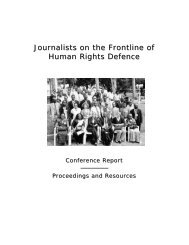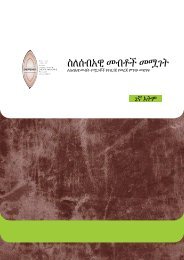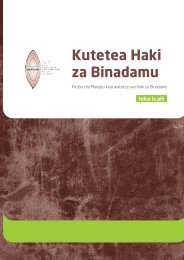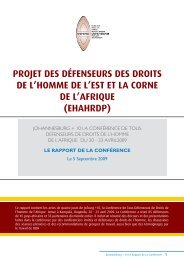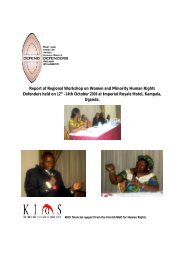Difaaca Xuquuqda Aadanaha - East and Horn of Africa Human ...
Difaaca Xuquuqda Aadanaha - East and Horn of Africa Human ...
Difaaca Xuquuqda Aadanaha - East and Horn of Africa Human ...
Create successful ePaper yourself
Turn your PDF publications into a flip-book with our unique Google optimized e-Paper software.
5. The work <strong>of</strong> human rights defenders <strong>of</strong>ten involves criticism <strong>of</strong> government policies <strong>and</strong> actions.<br />
However, governments should not see this as a negative. The principle <strong>of</strong> allowing room for independence<br />
<strong>of</strong> mind <strong>and</strong> free debate on a government’s policies <strong>and</strong> actions is fundamental, <strong>and</strong> is a tried <strong>and</strong> tested<br />
way <strong>of</strong> establishing a better level <strong>of</strong> protection <strong>of</strong> human rights. <strong>Human</strong> rights defenders can assist<br />
governments in promoting <strong>and</strong> protecting human rights. As part <strong>of</strong> consultation processes they can play a<br />
key role in helping to draft appropriate legislation, <strong>and</strong> in helping to draw up national plans <strong>and</strong> strategies<br />
on human rights. This role too should be recognised <strong>and</strong> supported.<br />
6. The EU acknowledges that the activities <strong>of</strong> human rights defenders have over the years become more<br />
widely recognised. They have increasingly come to ensure greater protection for the victims <strong>of</strong> violations.<br />
However, this progress has been achieved at a high price: the defenders themselves have increasingly<br />
become targets <strong>of</strong> attacks <strong>and</strong> their rights are violated in many countries. The EU believes it is important to<br />
ensure the safety <strong>of</strong> human rights defenders <strong>and</strong> protect their rights. In this regard it is important to apply a<br />
gender perspective when approaching the issue <strong>of</strong> human rights defenders.<br />
iv. Operational Guidelines<br />
7. The operational part <strong>of</strong> these Guidelines is meant to identify ways <strong>and</strong> means <strong>of</strong> effectively working<br />
towards the promotion <strong>and</strong> protection <strong>of</strong> human rights defenders, within the context <strong>of</strong> the Common<br />
Foreign <strong>and</strong> Security Policy.<br />
Monitoring, reporting <strong>and</strong> assessment<br />
8. EU Heads <strong>of</strong> Mission are already requested to provide periodic reports on the human rights situation<br />
in their countries <strong>of</strong> accreditation. The Council Working Party on <strong>Human</strong> Rights (COHOM) has approved<br />
the outline <strong>of</strong> fact sheets to facilitate this task. In line with these fact sheets Missions should address the<br />
situation <strong>of</strong> human rights defenders in their reporting, noting in particular the occurrence <strong>of</strong> any threats<br />
or attacks against human rights defenders. In this contexts HoMs should be aware that the institutional<br />
framework can have a major impact on the ability <strong>of</strong> human rights defenders to undertake their work<br />
in safety. Issues such as legislative, judicial, administrative or other appropriate measures, undertaken<br />
by States to protect persons against any violence, threats, retaliation, de facto or de jure adverse<br />
discrimination, pressure or any other arbitrary action as a consequence <strong>of</strong> their legitimate exercise <strong>of</strong> any <strong>of</strong><br />
the rights referred to the UN Declaration on <strong>Human</strong> Rights Defenders are all relevant in this regard.<br />
9. The EU Heads <strong>of</strong> Mission are requested to deal with the situation <strong>of</strong> human rights defenders at meetings<br />
<strong>of</strong> local working groups on human rights. Where it is called for, HoMs should make recommendations<br />
to COHOM for possible EU action, including condemnation <strong>of</strong> threats <strong>and</strong> attacks against human rights<br />
defenders, as well as for demarches <strong>and</strong> public statements where human rights defenders are at immediate<br />
or serious risk. HoMs may decide to conduct an urgent local action to support human rights defenders<br />
who are at immediate or serious risk, <strong>and</strong> to report on their action to COHOM <strong>and</strong> other relevant working<br />
parties with recommendations concerning the scope for following up the European action. HoMs should<br />
also report on the effectiveness <strong>of</strong> EU action in their reports. Furthermore, Missions should pay particular<br />
attention to the specific risks faced by women human rights defenders.<br />
10. The HoM reports <strong>and</strong> other relevant information, such as reports <strong>and</strong> recommendations from the<br />
Special Rapporteur on <strong>Human</strong> Rights Defenders, other UN Special Rapporteurs <strong>and</strong> Treaty bodies <strong>and</strong> the<br />
Commissioner for <strong>Human</strong> Rights <strong>of</strong> the Council <strong>of</strong> Europe as well as non-governmental organisations, will<br />
enable COHOM <strong>and</strong> other relevant working parties to identify situations where EU action is called for <strong>and</strong><br />
decide on the action to be taken or, where appropriate, make recommendations for such action to PSC/<br />
Council.<br />
Role <strong>of</strong> EU Missions in supporting <strong>and</strong> protecting human rights defenders<br />
11. In many third countries, EU Missions (Embassies <strong>of</strong> EU Member States <strong>and</strong> European Commission<br />
Delegations) are the primary interface between the Union <strong>and</strong> its Member States <strong>and</strong> human rights<br />
defenders on the ground. They therefore have an important role to play in putting into practice the EU’s<br />
60<br />
<strong>Difaaca</strong> <strong>Xuquuqda</strong> <strong>Aadanaha</strong>: Buug Xambaarsan Macluumaad loogu Talogalay <strong>Difaaca</strong>yaasha <strong>Xuquuqda</strong> <strong>Aadanaha</strong> | Caddadka 2aad



